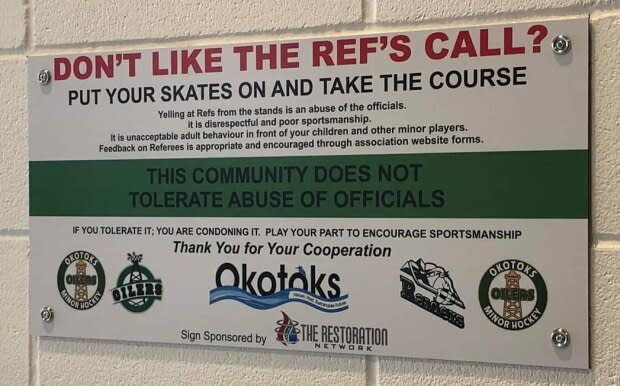Strongly worded signs encourage respect for minor hockey referees
If you don't like the referee's call, put your skates on and take the course. That's the message on the door of the Murray Arena at the Okotoks Recreation Centre.
There are other signs, posted by the Okotoks Minor Hockey Association (OMHA), peppered throughout the arena, but the messaging all follows the same vein: be more respectful.
Doug Brown, president of the Okotoks Referees Association, says disrespectful behaviour toward league referees is common.
Many young referees between the ages of 13 to 15 are still learning but leave because of the way they are treated during games.
"That's what disappoints me the most," Brown said.

"As you get more seasoned and as you go up through the ranks and get older … you have to have a thick skin to be a referee. It's just a reality of the game. As you mature, it makes it a lot easier to handle some of those things."
The OMHA offers a minor hockey program for people living in Foothills County, a rural municipality south of Calgary that includes the town of Okotoks.
The hockey association has high performance levels, community levels and a shinny hockey program that includes players from the age of five to 18, according to its website.
Game conduct should include "respect for other participants" among other things, according to the OMHA philosophy posted on its website.
Dustin Rustevakke has a 10-year-old son who plays hockey in the OMHA, but he says he personally doesn't see abuse toward referees when watching the games.
"Haven't seen much here. Everybody's got their respect in sport. Like if you have a kid in hockey, one parent has to take the respect in sport," he said.
"So that's respect the coaches, respect the players, respect the refs."
Brown says disrespect doesn't shock him. He explains abuse in hockey games take on many forms.
"Whether it be through body gestures, through yelling, just by staring somebody down — and they don't see the whole picture a lot of times," said Brown.
"They don't necessarily hear what's being said on the ice. So, no, it doesn't surprise me, and sometimes people act out and don't think it's wrong."
Brown hopes the signs will encourage a change in conduct among all who attend the games, and foster an environment of respect.

